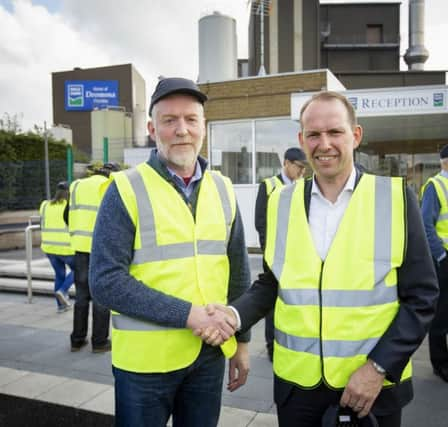Dale Farm targetssustainable profits


The farmer-owned co-op is currently turning over £500m from an 850m litre milk pool.
“All our manufacturing sites are now working at full capacity throughout the year,” Mr Whelan said.
Advertisement
Advertisement
“So, in reality, we need very little extra milk to keep our operation working at optimal efficiency.”
Mr Whelan made the comments while hosting a visit by members of the Guild of Agricultural Journalists to the Dale Farm plant at Dunmanbridge in Co Tyrone earlier this week.
He continued: “Paying the best possible price to our farmers is the key driver of the business. And we are succeeding in doing this.
“From an operational point of view, our objectives are to take cost out of the business, develop a branded future for Dale Farm, pay down our debt and create a working atmosphere that gets the very best from our staff.”
Advertisement
Advertisement
Mr Whelan said that the group’s growing range of products is giving a good balance to the business in terms of the returns it receives from the market place.
“We are committed to adding value to the milk produced by our farmer-members. And, in practical terms, this means developing new brands.
“Up to now the management at Dale Farm would have thought nothing of investing in new processing capacity and stainless steel.
“Now we need to adopt the same mindset when it comes to developing new brands. Investments of this nature may well a require a three-year payback. But if we get it right, it’s an investment worth making.”
Advertisement
Advertisement
Cheese is the big driver for Dale Farm. The plant at Dunmanbridge manufactures 55,000t of cheese on an annual basis. All of this is sold in either sliced or grated form to customers throughout the UK and Europe.
“It takes nine months for fresh milk to be processed into cheese and then sold on to retail customers,” said Mr Whelan.
“This means that milk coming into Dunmanbridge during the first week of April 2019 will not see the light of day as cheese until the early months of 2020. I don’t know what price cheese will be making on the open market at that time.
“So we are working with our retail customers on pricing schemes that reflect our costs in a meaningful way. In turn, this is helping to take the volatility out of the cheese making process.
Advertisement
Advertisement
Turning to other matters, Mr Whelan said that the UK government must pay serious attention to the issue of food security.
“Becoming overly reliant on food imports is not sustainable,” he explained
“Many of the countries with food surpluses at the present time will have problems of their own with issues such as water availability and soil degradation down the track.
“In such circumstances, exports from these parts of the world will dry up. And where would the UK be then?
Advertisement
Advertisement
“Meanwhile, there is tremendous potential for the UK to increase its own food output levels on a wholly sustainable basis.”
Whelan sits on the UK’s Food and Drinks Sector Council, within which he has a specialist interest in production agriculture.
He said that the focus of agri research undertaken in the UK must better reflect the needs of farmers on the ground.
“We also need to encourage more young people into production agriculture. The industry must be seen as one which can deliver excellent career prospects for the brightest and best young people in the country.
Advertisement
Advertisement
“Today, professions such as medicine and the law are go-to options when it comes to parents encouraging their children to follow rewarding careers.
“This must change: agriculture must become part of this mix.”
In order to achieve this Mr Whelan stressed the need for farmers to receive sustainable prices on an ongoing basis.
“The utilisation of new technologies will also be important in this regard as will the issue of ensuring that young people get access to the land which they will need to develop profitable businesses,” he commented.
Advertisement
Advertisement
“Better use of data will be critical for agriculture into the future. Farmers must be in a position where they can make decisions based on real time information.”
Mr Whelan confirmed that recommendations from the Food and Drinks Sector Council will be presented to the government in London within a matter of weeks.
He added: “A comprehensive report will follow, which can then be discussed at farmer level. But the bottom line is that we must take the required steps to improve agricultural productivity across the UK in a sustainable manner.
“The world’s population is set to reach nine billion people over the coming years. Long before we reach that point the world may well have run out of the soil and water resources required to feed a global population of this size.
Advertisement
Advertisement
“This is the key weakness of the UK following a cheap food policy. Given this scenario, the UK must put in place structures which ensure that its farming industry has the wherewithal to address the food security challenge on its own door step. The primary responsibility of government is that of feeding its own people.”